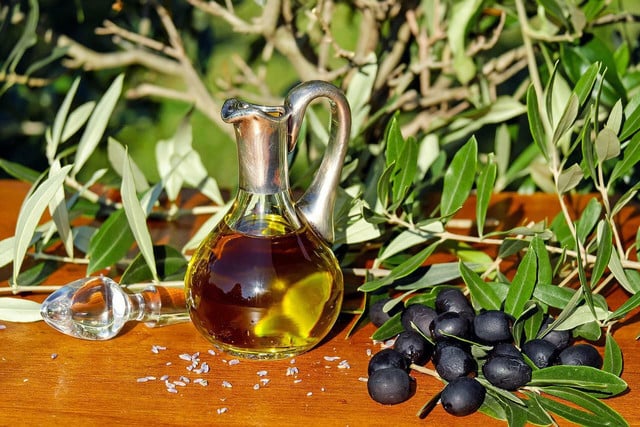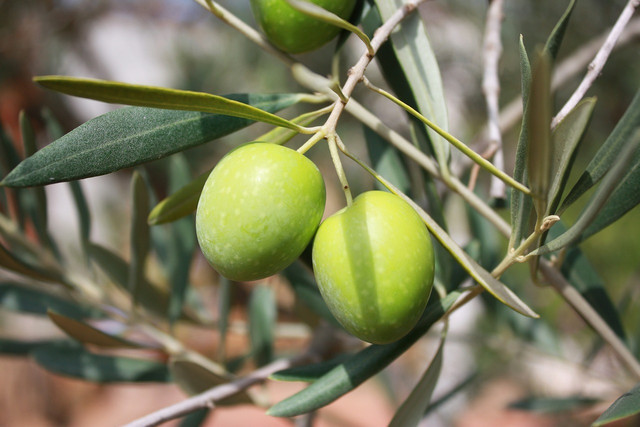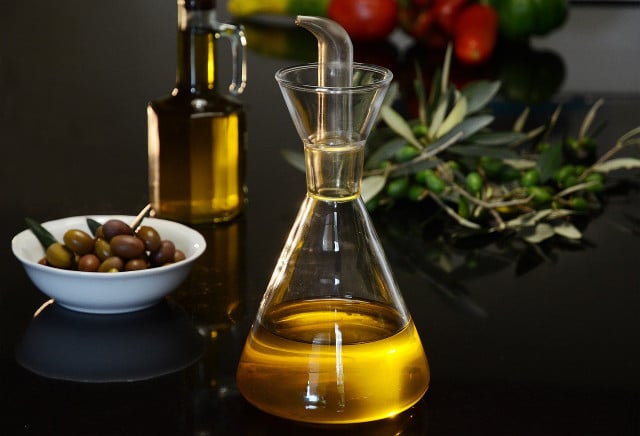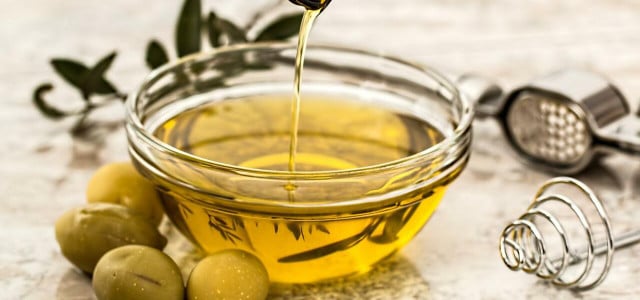Olive oil has many uses and benefits. Due to the range of olive plantation types and agricultural methods used in production, the sustainability of olive oil is complicated.
Olive oil mostly comes from Europe, with the top exporters being Spain, Italy, Greece, Portugal, and Turkey.
There are several different ways in which olive oil is harvested and produced. Machines that shake the trees can also be used, as well as industrial machines, which envelope the entire tree and suck off all the olives. Still, traditional methods involve no machinery at all. This is because using power tools often damages both the tree branches and the olives themselves. In order to maintain the quality of the olives, it’s best to be gentle. Most harvesters use simple tools like rakes and nets in order to pick lots of olives at once without hurting the trees or the olives. The most high-quality olive oil starts with hand-picked olives directly into the basket. Hand-picking, while less efficient, allows for the selection of only the best olives. Large corporations prioritizing profits over quality are those which employ heavy machinery.
The production of olive oil, on the other hand, is almost always done entirely mechanically. Olives are washed and then ground into a paste, pits included. The olive paste is mixed carefully and then cold-pressed to separate the oil from the vegetable water and pomace, which are discarded. The pure oil containing less than .8% acidity is classified as extra virgin olive oil. This is the most desirable, high-quality olive oil. Its color is dark green, and it has a rich flavor and aroma. Usually, extra virgin olive oil is only extracted during the first pressing of the olives. The oil that doesn’t meet the extra virgin standards is further refined in order to rid of impurities. The further pressing results in what is simply labeled ‘olive oil.’ The resulting olive oil has a more neutral flavor and aroma compared to the extra virgin olive oil. It is also more yellow in color.
Olive Oil Uses

(Foto: CC0 / Pixabay / 1195798)
There are many ways in which people use olive oil, cooking being the most common. The deliciously strong flavor and aroma of extra virgin olive oil make it perfect for dressings, dips, drizzles, and other uncooked foods. For cooking and baking, regular olive oil is more commonly used. You can sauté and fry food with olive oil, as well as incorporate it into a sweet lemon or zucchini bread loaf. Of course, extra virgin olive oil can be used in cooking as well, but it is typically more expensive than regular olive oil, and the difference in taste is barely noticeable in cooked foods. This is why many people keep their top-shelf oil for other foods like salads and avocado toast.
Olive oil is a regular part of many people’s diets and is well known for its many health benefits. Olive oil is a mono-unsaturated fat (meaning it won’t clog your arteries), is low in cholesterol, and packed with antioxidants, vitamins, and minerals. It’s even been shown to improve heart health, help reduce the risk of stroke, promote good cholesterol, and prevent cognitive decline in individuals with Alzheimer’s disease.
Olive oil can also be used topically. Due to its anti-inflammatory properties and more, olive oil has many benefits for the face and skin, ranging from anti-aging to wound healing. It is also common to use olive oil in haircare for dry and split ends, as well as in hair styling. It’s no wonder olive oil is found in so many hair and skin products, as well as DIY recipes. Many people swear by overnight olive oil hair masks, for example.
Is Olive Oil Sustainable?



(Foto: CC0 / Pixabay / nataliaaggiato)
There are many factors to consider when rating the sustainability of olive oil. In some ways, olive oil production is more sustainable than its counterparts. Unlike canola, corn, and vegetable oil, olive oil is produced without using any chemical solvents. It’s also cold-pressed, meaning there is no heat used in this process.
Still, according to an EU report, olive plantations have several negative environmental impacts on soil and water. One of the major impacts of olive growing and harvesting is the erosion and desertification caused by production processes in areas that are already dry. Much of this is due to inappropriate agricultural practices used by farmers. Pollution of groundwater, soil, and drinking water was also found due to the use of synthetic fertilizers and pesticides. Other negative impacts include the degradation of natural habitats and landscapes and the exploitation of scarce water resources. The production of olive oil also results in excessive waste of vegetable oil and pomace, which can be damaging to the environment when not properly disposed of.
The most unsustainable and environmentally damaging olive plantations were found to be modern plantations using intensive industrial machinery and irrigation systems. The traditional businesses using little to no chemicals and lower density tree plantations had a higher value in terms of biodiversity and landscape. They also had better water management and the least negative effects on the environment.
Buying Sustainable Olive Oil



(Foto: CC0 / Pixabay / ubert)
Despite the fact that certain types of olive oil production have negative environmental impacts, olive oil is still considered one of the most sustainable cooking oils. There are also steps consumers can take in order to purchase the most sustainable products. Buying certified organic olive oil is best in order to mitigate environmental damage, as many of the negative environmental effects cited are a result of pesticide and fertilizer usage, as well as inappropriate waste removal. It’s also recommended to buy from small businesses harvesting by hand from traditional plantations. These plantations have the lowest environmental impact, and the olive oil produced is of higher quality as well.
Purchase olive oil from your local farmer’s market, or read up on some of the brands you see at the grocery store. By purchasing from small businesses which don’t operate heavy machinery, you can cut down your carbon footprint. You’re also more likely to find family businesses which is a good way to avoid supporting companies that employ either illegal or permitted migrant workers who suffer horrid living conditions, long hours, low wages, and total isolation from the community.
Olive Oil Substitutes



(Foto: CC0 / Pixabay / DanaTentis)
While there are delicious and sustainably made olive oils on the market, they can be expensive. Alternatives that use more sustainable processing methods include flaxseed (also known as linseed) oil, hemp oil, and rapeseed oil. All three oils are similar to olive oil as they are cold-pressed. They are also full of polyunsaturated fats. We recommend any of these three oils as they have a low impact on the environment and a wide range of benefits. All three oils are great for cooking. Just keep in mind rapeseed oil has a high smoke point. You can use flaxseed oil for hair care and growth and hemp oil for skincare. The latter makes a great olive oil substitute in skincare as it is anti-inflammatory and antibacterial, and it won’t clog pores. It’s also full of health benefits. Other relatively similarly sustainable cooking oils include certified organic and fair trade vegetable oil and sunflower oil, although these oils do not contain as many health benefits as olive oil.
Read more:
- Can You Freeze Olive Oil? Here’s The How And Why
- 6 Hemp Heart Benefits and Uses
- Babassu Oil: Properties, Uses, and Sustainability
Important Information regarding Health-related Topics.
** Links to retailers marked with ** or underlined orange are partially partner links: If you buy here, you actively support Utopia.org, because we will receive a small part of the sales proceeds. More info.Do you like this post?






